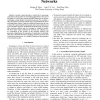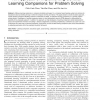2936 search results - page 162 / 588 » Cooperative Learning in Simulation |
JUCS
2008
13 years 8 months ago
2008
: Multi-Agent Systems (MAS) constitute a well known approach in modelling dynamical real world systems. Recently, this technology has been applied to Wireless Communication Systems...
INFOCOM
2009
IEEE
14 years 2 months ago
2009
IEEE
— Incentive protocols play a crucial role to encourage cooperation among nodes in networking applications. The aim of this paper is to provide a general analytical framework to a...
MTA
2011
13 years 3 months ago
2011
: With the advances in a variety of software/hardware technologies and wireless networking, there is coming a need for ubiquitous collaboration which allows people to access inform...
TKDE
2002
13 years 8 months ago
2002
Adding a learning companion, a computer simulated social agent, to a computer based learning system can enhance its educational value by enriching the way in which the computer and...
CIG
2005
IEEE
14 years 1 months ago
2005
IEEE
AbstractGroup utility functions are an extension of the common team utility function for providing multiple agents with a common reinforcement learning signal for learning cooperat...


